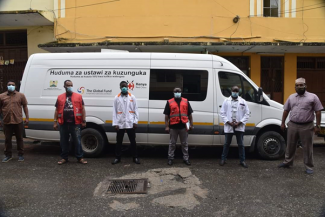UNODC Ensuring Continuum of Care for People Who Use and Inject Drugs, Including Those in Prisons During COVID-19 in Coastal Kenya

The United Nations Office on Drugs and Crime (UNODC) Regional Office for Eastern Africa (ROEA) supports Kenyan counties in COVID-19 prevention efforts for key and most vulnerable populations. In the spirit of leaving no one behind, acknowledging the increased infection risks of people who use and inject drugs, including those in prison settings, an in an effort to be COVID-19 responsive, UNODC focused its technical and financial support to expand the range existing and new services offered by UNODC to these populations.
UNODC provided prevention equipment and commodities to ensure that both staff and clients remain safe and coronavirus-free. To guarantee safe working conditions for clinic staff, drop-in center staff and outreach workers, and the safety of clients 5,000 medical examination gloves, 8 automatic sanitizer dispensers, 405 litres of hand sanitizer, 50 bottles of hand washing gel, 20 kg of washing powder soap, 280 N95 masks and 3,100 three-ply surgical masks for health care workers were delivered to treatment and care services. An additional 3,200 re-usable waterproof textile masks were distributed to all Medically Assisted Therapy (MAT) client who cannot afford one. More commodities are currently being procured to support people living and working in prisons.
During this unprecedented crisis, people who use and inject drugs require the same level of care and prevention measures that are offered to the general population. In this context, UNODC was able to support five (5) Civil Society Organizations to roll-out community mobilization and sensitization among people who use and inject drugs, as well as to ensure the continuity of HIV comprehensive package of services delivery, continuum of care and to maintain client's adherence to drug treatment.
Moreover, in response to the COVID-19 pandemic, the national government's directive has put measures of restricted movement in certain areas within high risk counties in place, such as Mombasa, specifically Old Town to respond to the increasing incidences. This lockdown has led to restricted access to services for people who use and inject drugs within these areas. UNODC supports the collaborative efforts of Central Government through the Ministry of Health, County Health Authorities and Civil Society Organizations in the Coastal Counties of Kenya to provide continues drug use disorder treatment services and comprehensive HIV prevention, including outreach, psychosocial support and other social services.
To decrease the risks of increased infections through movements of people from a locality of high incidence and further compounded by a highly congested MAT clinic, UNODC has partnered with the Kenya Red Cross Society to initiate a mobile dispensing facility to MAT clients living within the lockdown areas in Mombasa. This is the first of such dispensing modality in Kenya. Similarly, in order to further limit the movements of MAT clients, a number of them are receiving take home dosing under close supervision of their relatives. In parallel, similar measures will soon be introduced in Nairobi and Kiambu, to guarantee uninterrupted access to the needs of clients and at the same time create safe working conditions for clinic staff and service users through decongestion of the facilities. In Kilifi county, a "take home" initiative has been initiated for MAT clients in the prisons who were taken by escorts to the MAT clinic in Malindi on a daily basis before the COVID-19 pandemic.
It is important to remember that people who use and inject drugs are especially vulnerable to COVID-19 due to their immunocompromised status as a result of their underlying medical conditions like HIV, TB and Hepatitis C, further compounded by stigma and social marginalization. Providing timely assistance to the counties, the Civil Society Organizations, people who use or inject drugs and their families will contribute to national efforts to keep all populations safe and COVID-19 free.
